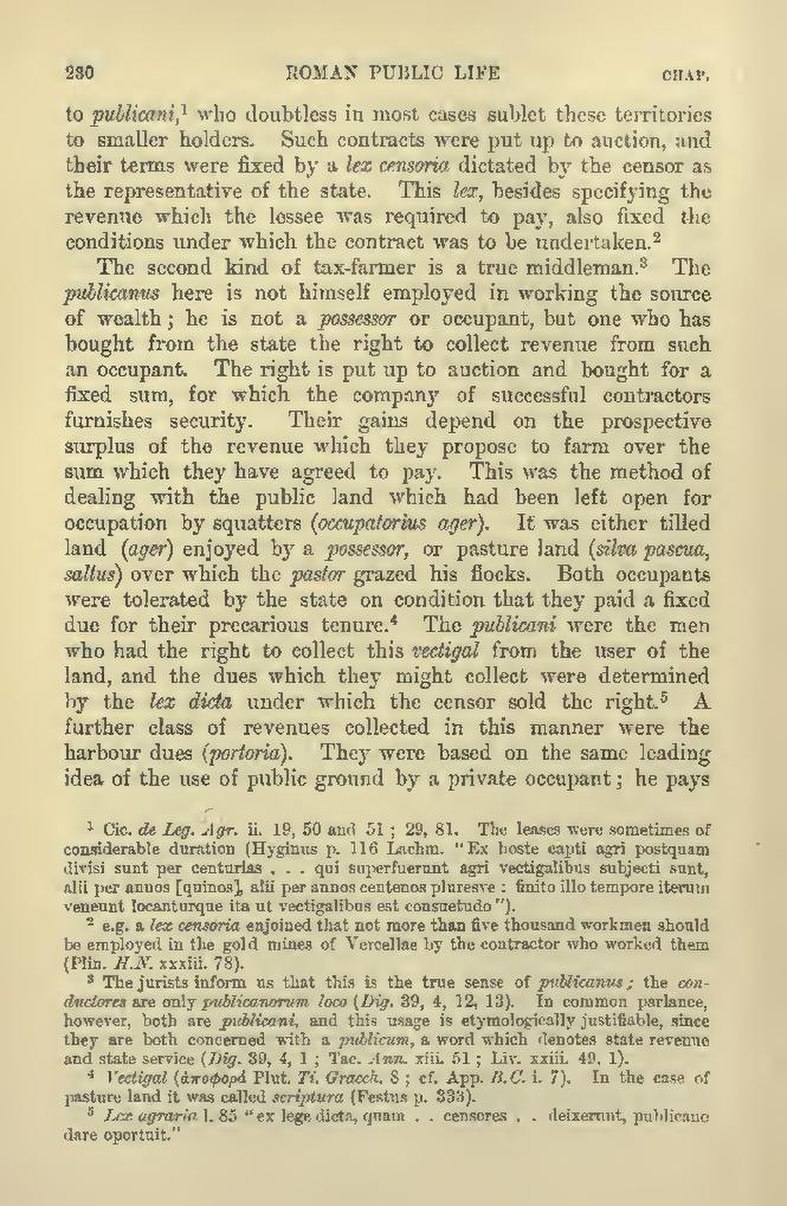to publicani,[1] who doubtless in most cases sublet these territories to smaller holders. Such contracts were put up to auction, and their terms were fixed by a lex censoria dictated by the censor as the representative of the state. This lex, besides specifying the revenue which the lessee was required to pay, also fixed the conditions under which the contract was to be undertaken.[2]
The second kind of tax-farmer is a true middleman.[3] The publicanus here is not himself employed in working the source of wealth; he is not a possessor or occupant, but one who has bought from the state the right to collect revenue from such an occupant. The right is put up to auction and bought for a fixed sum, for which the company of successful contractors furnishes security. Their gains depend on the prospective surplus of the revenue which they propose to farm over the sum which they have agreed to pay. This was the method of dealing with the public land which had been left open for occupation by squatters (occupatorius ager). It was either tilled land (ager) enjoyed by a possessor, or pasture land (silva pascua, saltus) over which the pastor grazed his flocks. Both occupants were tolerated by the state on condition that they paid a fixed due for their precarious tenure.[4] The publicani were the men who had the right to collect this vectigal from the user of the land, and the dues which they might collect were determined by the lex dicta under which the censor sold the right.[5] A further class of revenues collected in this manner were the harbour dues (portoria). They were based on the same leading idea of the use of public ground by a private occupant; he pays, alii per annos centenos pluresve: finito illo tempore iterum veneunt locanturque ita ut vectigalibus est consuetudo").]) Plut. Ti. Gracch. 8; cf. App. B.C. i. 7). In the case of pasture land it was called scriptura (Festus p. 833).]
- ↑ Cic. de Leg. Agr. ii. 19, 50 and 51; 29, 81. The leases were sometimes of considerable duration (Hyginus p. 116 Lachm. "Ex hoste capti agri postquam divisi sunt per centurias . . . qui superfuerunt agri vectigalibus subjecti sunt, alii per annos [quinos
- ↑ e.g. a lex censoria enjoined that not more than five thousand workmen should be employed in the gold mines of Vercellae by the contractor who worked them (Plin. H.N. xxxiii. 78).
- ↑ The jurists inform us that this is the true sense of publicanus; the conductores are only publicanorum loco (Dig. 39, 4, 12, 13). In common parlance, however, both are publicani, and this usage is etymologically justifiable, since they are both concerned with a publicum, a word which denotes state revenue and state service (Dig. 39, 4, 1; Tac. Ann. xiii. 51; Liv. xxiii. 49, 1).
- ↑ Vectigal ([Greek: apophora
- ↑ Lex agraria l. 85 "ex lege dicta, quam . . . censores . . . deixerunt, publicano dare oportuit."
